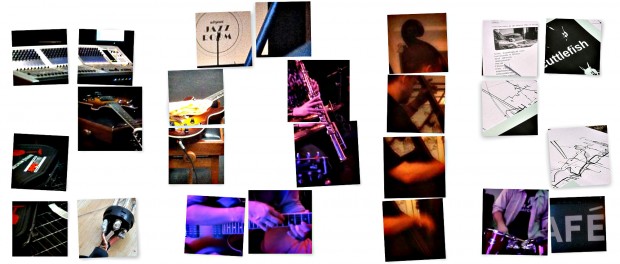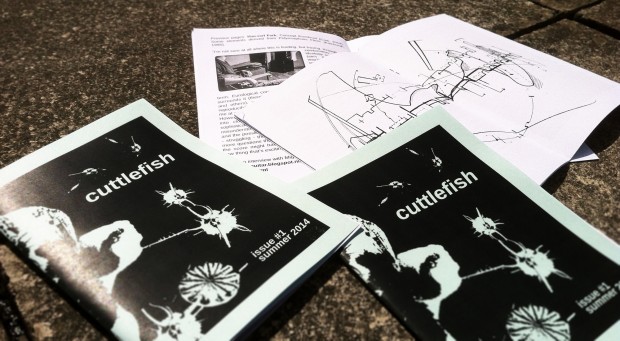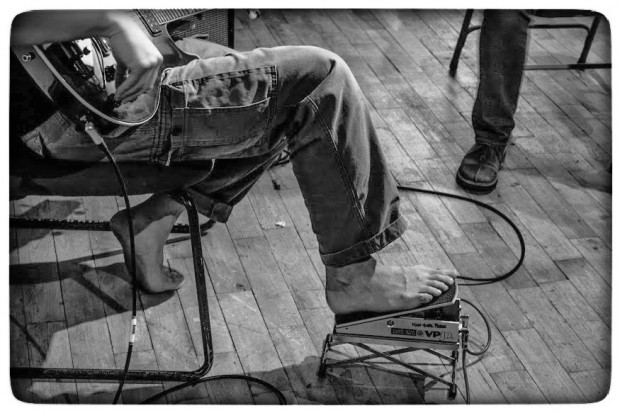
Happy New Year: 2015



I’m honored to find my concept thumbnail (‘Study in Notation’) in the pages of cuttlefish (issue #1, summer 2014), a “zine for contemporary culture, music, art, aesthetics, politics,” edited by Peter O’Doherty. The piece was accompanied by an excerpt from my interview with Miguel Copón:
I’m not sure at all where this is leading, but having through some combination of ideology and necessity (ain’t it always the way?) found myself somewhat involuntarily in the ‘Total Improvisation’ camp, I’m beginning to look on the other side of the fence. Let me be clear, the, to borrow Lewis’ term, Eurological conception of the score and the practice that surrounds it (theorized in detail by Small, Cusick, Nicholas Cook and others), with its limited models of control and dogma of reproducibility, and naive notions of aesthetics, does not interest me at all.
However, I’m feeling a gravitational tug. Maybe it’s due to coming into close contact with musicians who have a much more sophisticated (if often, from an non-practitioner’s POV, misunderstood and under theorized) relationship with the score and the possibilities of notation. But it’s a distinct pull. Still working—struggling—through some ideas, and studies, and have far, far more questions than answers about the possible role notation and the score might have in an improvisative context, but that’s the new thing that’s exciting me at the moment. [Read the rest…]
The theme of cuttlefish’s inaugural issue is “work-in-progress (sketches, doodles, journal entries, streams of consciousness…),” and features contributions by Wim Bollein, Laura Duran, Evgeniy Aleksandrovich (=dozen), Graham Holliday, ja’s ink on paper, Daniel Kan, Francisco Martins, Corey Mwamba, Ciarán Ó Dochartaigh, Peter O’Doherty, Han-earl Park, Kiyomitsu Saito, Tom Tebby, Nicolas P. Tschopp, Andrea Valle, Krysthopher Woods and Alice Xiang.
If you are interested in contributing to future issues of cuttlefish, please contact cuttlefish[at]peterodoherty.net.

For Miguel Copón, Prepared Guitar is a “metaphor about metamorphosis” and a “place to support independent artists”. Prepared Guitar recently published my response to Copón’s 13 Questions, so you can now read, among other things, about my first guitar, my musical roots (as contradictory as they may be), and what I’m currently working on:
A CD with Catherine Sikora, Nick Didkovsky and Josh Sinton in the works. Looking to fire up a couple of European projects after a hiatus: the duo with Richard [Barrett], and Mathilde 253 with Charles Hayward and Ian Smith.
But the thing that’s tugging at me right now is the possibilities of the score in the context of improvisative performance. Ideas, some specific, some nebulous, all as yet untested about what might be possible…
I’m not sure at all where this is leading, but having through some combination of ideology and necessity (ain’t it always the way?) found myself somewhat involuntarily in the ‘Total Improvisation’ camp, I’m beginning to look on the other side of the fence. Let me be clear, the, to borrow Lewis’ term, Eurological conception of the score and the practice that surrounds it (theorized in detail by Small, Cusick, Nicholas Cook and others), with its limited models of control and dogma of reproducibility, and naive notions of aesthetics, does not interest me at all.
However, I’m feeling a gravitational tug. Maybe it’s due to coming into close contact with musicians who have a much more sophisticated (if often, from an non-practitioners POV, misunderstood and under theorized) relationship with the score and the possibilities of notation. But it’s a distinct pull. Still working—struggling—through some ideas, and studies, and have far, far more questions than answers about the possible role notation and the score might have in an improvisative context, but that’s the new thing that’s exciting me at the moment. [Read the rest…]
You can also read my struggle with a question about the necessity of music, my take on the current digital music scene, and the politics of ‘extended technique’:
So what’s being ‘extended’ by ‘extended technique’? Is it akin to, say, a colonial explorer extending their influence and territory; ‘discovering’ a land (regardless of whether some other people were there first)?
Had an interested online exchange with Hans Tammen on the subject, and it struck me how much the term ‘extended technique’ is a way to distinguish pioneers from the rest of us. Where you draw those lines (between common practice and extended technique) says much more about your own history and prejudices than some essential quality of the technique in question.
Ishmael Wadada Leo Smith once pointed out how Stockhausen claimed the invention of certain ‘extended techniques’ for the trumpet that were patently false if you had even a passing knowledge of practices outside of West European traditions. Did Stockhausen, and his supporters, claim these techniques because of a kind of ignorance, or as a deliberate erasure of other traditions? Either way, it requires a heavy dose of privilege to ignore, to justify your ignorance, or to mark peoples and cultures as irrelevant. [Read the rest…]
Looking through the list of respondents to the 13 Questions, I’m honored to find my name among those guitarists whose work I admire. I’m grateful that Miguel Copón asked me to participate.